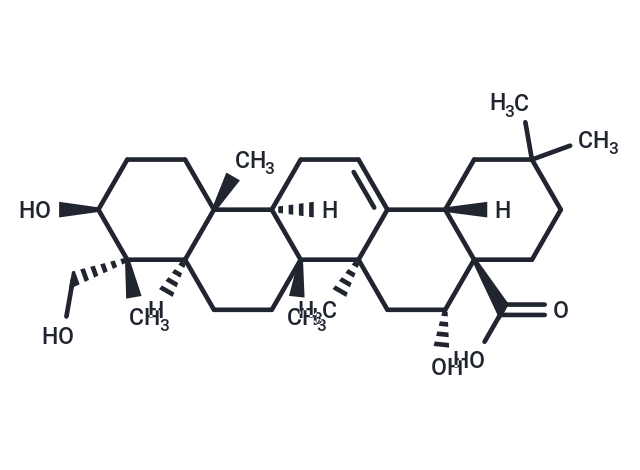Shopping Cart
- Remove All
 Your shopping cart is currently empty
Your shopping cart is currently empty

Caulophyllogenin is a partial PPARγ agonist (EC50 = 12.6 μM) derived from the stem bark of Kalopanax pictus (Araliaceae). Caulophyllogenin inhibits pro-inflammatory cytokine secretion and can be used in studies about the prevention and treatment of inflammatory diseases, type-2 diabetes, obesity and metabolic syndrome.

| Pack Size | Price | Availability | Quantity |
|---|---|---|---|
| 1 mg | $113 | In Stock | |
| 5 mg | $267 | In Stock | |
| 10 mg | $392 | In Stock | |
| 25 mg | $656 | In Stock | |
| 50 mg | Preferential | In Stock |
| Description | Caulophyllogenin is a partial PPARγ agonist (EC50 = 12.6 μM) derived from the stem bark of Kalopanax pictus (Araliaceae). Caulophyllogenin inhibits pro-inflammatory cytokine secretion and can be used in studies about the prevention and treatment of inflammatory diseases, type-2 diabetes, obesity and metabolic syndrome. |
| Targets&IC50 | PPARγ:12.6 μM (EC50) |
| In vitro | Caulophyllogenin inhibits IL-12 p40, IL-6, and TNF-α with IC50s ranging from 3.3 to 20.0 μM[1]. |
| Alias | Segetalic acid |
| Molecular Weight | 488.7 |
| Formula | C30H48O5 |
| Cas No. | 52936-64-8 |
| Smiles | C(O)(=O)[C@]12[C@](C=3[C@@](C)(C[C@H]1O)[C@@]4(C)[C@](CC3)([C@]5(C)[C@@](CC4)([C@@](CO)(C)[C@@H](O)CC5)[H])[H])(CC(C)(C)CC2)[H] |
| Relative Density. | 1.31g/cm3 |
| Storage | store at low temperature | Powder: -20°C for 3 years | In solvent: -80°C for 1 year | Shipping with blue ice. |

Copyright © 2015-2025 TargetMol Chemicals Inc. All Rights Reserved.